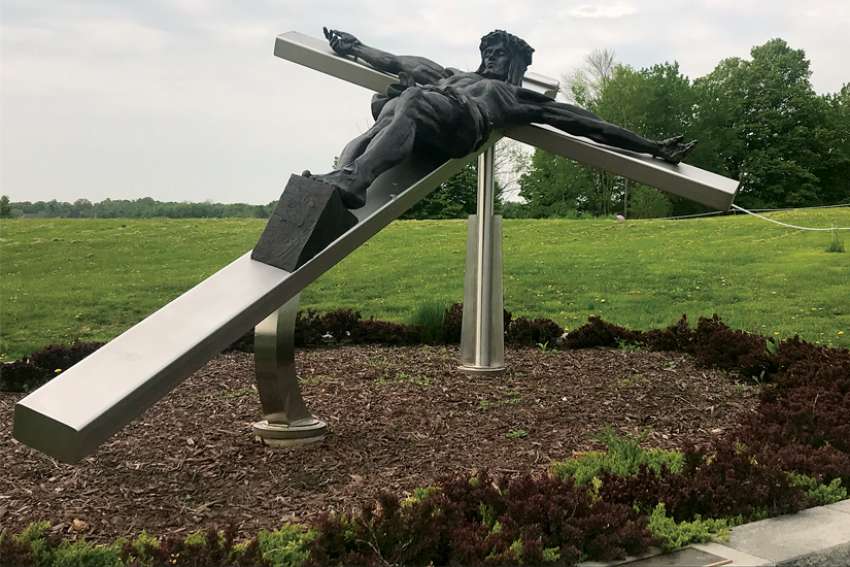That was my experience at the Rosary Path at Marylake, run by the Augustinians and touted as the world’s largest living rosary. Located 30 minutes north of Toronto in King City, the Rosary Path is a peaceful escape from the hustle and bustle of life in the city. Linked pink and white rosary beads are spread across a winding 1.5-km path, and the 19-acre landscape is punctuated with statues of Mother Mary amidst a backdrop of nature.
Walking the path is prayer in motion. The physicality helps bring the joys and sorrow of the rosary to life on what feels like a mini-pilgrimage. You don’t just pray the rosary, you enter into it intimately.
The path starts at a 7.5-metre statue depicting the crucified Jesus. Immediately, it grounds you in the reality of the faith and the reason for your visit. When you detect the hum of others praying nearby the route is infused with the spirit of faithful community.
Running parallel to the rosary beads alongside the path are the Stations of the Cross, which add another prayerful dimension. Images etched in vivid stained glass illustrate each of the stations. It was here that we encountered a family of geese, which scurried alongside my mom and I as we prayed the second decade.
The Rosary Path is a great summer escape for Catholics in the Archdiocese of Toronto, but I was interested to learn that internationally there is a wide array of “record-breaking” rosaries, both indoor and out, that have been assembled — or curated — to help the faithful meditate on the sacred mysteries.
In the Philippines, for example, a reported 25,000 people formed the world’s largest human rosary at the University of Santo Tomas in Manila in 2010. Participants wore different coloured t-shirts depending on whether they were representing a bead, the cross or a connecting chain.
In Tagum City, a giant rosary outside of Christ the King Cathedral weighs more than 6,000 pounds — with each of its roughly 77-pound beads fashioned from iron wood native to the local mountains of Davao Oriental and Surigao del Sur.
A museum in Washington state boasts a whopping 4,000 rosaries, the largest collection in the world, according to Ripley’s Believe It or Not. They belonged to the late Donald A. Brown, a Catholic convert who began collecting rosaries in 1917 after a bout of pneumonia brought him into contact with the Sisters of Mercy, who cared for him in hospital.
In Lebanon, there is a project underway to construct a concrete rosary path not that far away from neighbouring Syria, where many Christians are persecuted for their faith. The living rosary being built by the Lebanese Maronite order will measure 600 metres long and will be built in such a way that visitors can pray inside the Hail Mary “beads” — which look like little mushroom-capped huts — and go to confession inside the Our Fathers.
What is it that makes all these renderings and experiences that are related to the prayer given to us by Our Lady so compelling?
Having visited Marylake, I can attest to the power of combining movement and prayer. It’s often said that movement is medicine — meaning that exercise can prevent and help to alleviate symptoms of illness. In the spiritual realm, movement in prayer helps bring prayer to life.
I was profoundly struck by how that movement affected me as I walked from decade to decade through the winding path. Every step was intentional. You are required to make a conscious decision to keep going, to keep praying. I could feel the spiritual flame of pilgrimage guiding us along and helping us focus on why we were there, for prayer.
Sr. Lucia of Fatima, one of the children who witnessed the Marian apparition in Fatima a century ago, famously said, “There is no problem I tell you, no matter how difficult it is, that we cannot resolve by the prayer of the Holy Rosary.”
It can be a struggle to fit prayer into our daily lives, and the Rosary Path at Marylake is certainly not an every-day outing. But the reality is that we all need the Blessed Mother’s help and support. Walking and praying along the Rosary Path was a good reminder of that.
Move. Pray the rosary. Repeat.
(Santilli-Raimondo is a communications co-ordinator in the Office of Public Relations and Communications at the Archdiocese of Toronto.)


